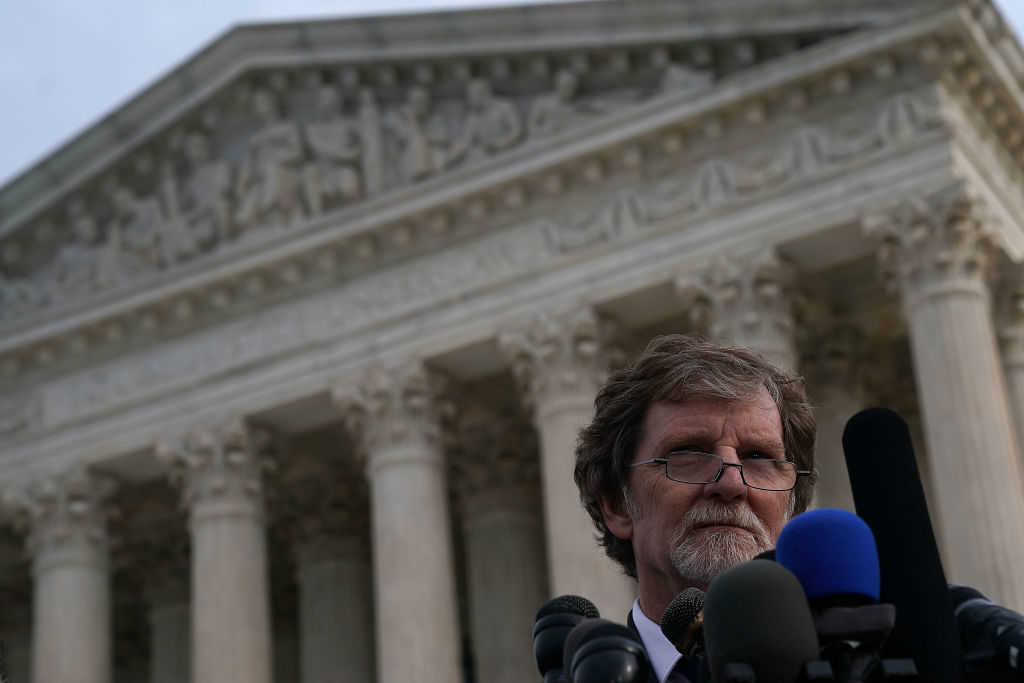The Supreme Court showdown in the Masterpiece Cakeshop v. Colorado Civil Rights Commission case ended on Tuesday with no clear indication of how, exactly, the justices will respond in their final verdict.
READ: Christian Baker Pleads His Case as Highly Anticipated Supreme Court Showdown Set to Begin
At the center of the coming ruling is Justice Anthony Kennedy, who is expected to be the deciding vote.
Kennedy appeared to take into account arguments from both baker Jack Phillips’ team as well as the Colorado government amid its defense of a gay couple whose wedding cake Phillips declined, with the Associated Press reporting that Kennedy voiced “competing concerns” during Tuesday’s proceedings.
The Wall Street Journal also concluded that there’s “no easy prediction on the case’s outcome” and noted Kennedy’s take in detail:
Justice Anthony Kennedy, expected to be the deciding vote, showed deep understanding and respect for both sides and their arguments, and concern for the implications of the court’s eventual ruling. But liberals like Justice Breyer also showed sympathy for the baker’s right to his beliefs, while conservatives such as Justice Gorsuch raised concerns about opening too wide a door. It was clear that many of of the justices wished there was a way to reconcile the competing values in a workable way–even if the arguments ended with no evident path to such an outcome.
Kennedy, a moderate conservative who authored the 2015 court decision legalizing same-sex marriage, questioned how Colorado’s public accommodations law was applied to Phillips, and even went as far as to say to the state’s attorney that it seemed “the state has been neither tolerant or respectful” to the baker’s perspective.
The justice added that tolerance is “essential in a free society” and that it must work both ways. In this case, as in many others, Kennedy is expected to be the swing vote.
But earlier he worried that a victory for Phillips could mean that signs would go up in shops that read, “We do not bake cakes for gay weddings.” The SCOTUS Blog breaks all of this down:
With Kennedy seemingly holding the key vote, the [gay] couple and their supporters at first seemed to have reason to be optimistic. Discussing the impact that a ruling for the baker could have for gays and lesbians, Kennedy told Solicitor General Noel Francisco, who argued on behalf of the United States in support of Masterpiece Cakeshop, that if the baker were to win, he could put up a sign indicating that he would not bake cakes for same-sex couples. That, Kennedy suggested, would be “an affront to the gay community.”
But the tide seemed to shift later in the argument, as Kennedy asked Colorado Solicitor General Frederick Yarger, representing the state, about a statement by a member of the Colorado Civil Rights Commission who noted that religious beliefs had in the past been used to justify other forms of discrimination, like slavery and the Holocaust. It is, the commission member contended, “one of the most despicable pieces of rhetoric that people can use their religion to hurt others.” If we thought that at least this member of the commission had based his decision on hostility to religion, Kennedy asked Yarger, could the judgment against Masterpiece stand?
Kennedy returned to this idea again a few minutes later, telling Yarger that “tolerance is essential in a free society.” But Colorado, Kennedy posited, hasn’t been very tolerant of Phillips’ religious beliefs in this case. And, following up on Gorsuch’s suggestion that the training required of Phillips would amount to compelled speech, Kennedy commented (more than a little derisively) that Phillips would “have to teach that state law supersedes our religious beliefs.”
It’s unclear how the case will all shake out. Perhaps Phillips wins, maybe the state or couple win — or perhaps the case is returned to the Colorado Civil Rights Commission to be reconsidered on the basis that religious discrimination colored the initial claim.
A decision is expected by next summer. Read more analysis about Tuesday’s proceedings here and learn more about the overarching legal debate here.



